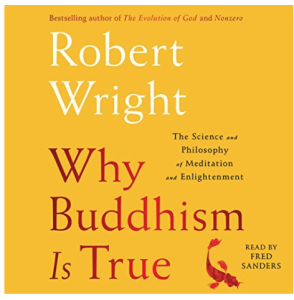Disclaimer: I am not a Buddhist. And by admission, neither is the author.
The main title, Why Buddhism is True, is a bit misleading. Throughout most of the book, the author threads interesting, up-to-date, and digestible logic as to the (potentially huge) benefits of practicing mindful meditation. As a beginning meditator, Wright’s reasoning was compelling enough to have me hooked from the start.

If only we could all start young with this practice.
But you don’t need to be attracted to meditation to be captivated by the book. In fairness, Wright does provide an abundance of thought-provoking (no pun) data not only from science, but also from modern psychology which seems to coincide with basic Buddhists concepts of not-self/emptiness, liberation from delusion (how we see ourselves is largely an illusion), and our thinking mind’s “default mode network.”
If anyone is, (shouldn’t we all be), interested in understanding the mechanics behind how feelings shape thoughts, behaviors, and perceptions, and how, through practice, we can become aware of “things in our environment that affect those feelings,” than the book is well worth the investment. Some feelings, he says “are good guiding lights,” while others can “push us around.” He provides first-hand examples of how we might successfully manipulate the feelings that may not be benefiting us.

Even Newark’s airport has a meditation room.
Wright speckles the book with his own experiences, mainly with dry, relatable, yet subtlely perky humor. I found myself laughing out loud several times throughout the book.
The value of meditation, he says, is its use as a fundamental tool, one that enables us to see the stories we build and how we can more clearly separate illusion from truth. In other words, he says, mindfulness meditation helps us change our perception of the world, even with potentially simple annoyances like crabgrass, the buzzsaw of construction noise, or the impulse to respond to a pricky email. He also describes the benefit of continued meditation as an evolving capacity of “seeing things with higher resolution.”
The key, he says, through daily practices of mindful meditation, is becoming more aware of “what causes what,” (causality). But, he explains, the fruits of meditation is more than just awareness. It’s active learning how to change negative into positive.
The crux of the book and Wright’s principal argument for our feelings, he outlines, is the “conditioning” of natural selection, which is built into our core from millions of years of evolution. But many “natural tendencies” which served our species well over time may also be working against us (in our relatively recent, densely populated global community). He describes, through meditation, how we can “subvert the programming of (the undesirable aspects of) natural selection,” to achieve a measurable, positive impact in our lives and of those around us. In effect, he is saying that Darwin confirmed the truth behind Buddhism.
After listening to his book (twice) it’s hard not to believe him.
- Share





